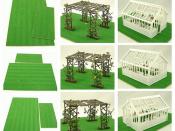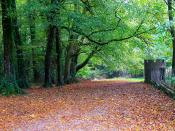In all the expansion that the Roman Empire undertook, one of it's most significant achievements was its Romanisation of Britain, which was previously inhabited and run by Celtic tribes. Once the Romans took over, they went out of their way to turn Britain into a second Rome. The changes implemented by the Romans had a significant affect on important aspects of daily life including housing, social status and leisure and entertainment. In order to understand the changes that the Romans brought to Britain, it is important to look at the key aspects of daily lives of both Roman soldiers posted in Britain and also its native inhabitants.
Native Inhabitants
The life of a native Celt during the Roman occupation was dependant on the wealth and social status. Those who were wealthy were able to adopt the Roman way of life and enjoy the many luxuries that Roman culture had to offer.
Roman rule, however, probably made little difference to most poor Celts, especially in the north and extreme southwest of England. For them life went on much as it had before, which can be seen when looking at key aspects of daily life
Housing
In Roman Britain, at least 3 million people lived in the countryside in dwellings that ranged from wattle-and-daub huts to substantial stone-built Roman farmsteads. The wattle and daub huts were identical to those in which the Iron Age peasant had lived and were especially common in northern and western areas of Britain. They were of simple structure, which would have an eating table and some room for sleeping. These were generally inhabited by the simple and poor Celts.
Most villas were farms and were generally inhabited by the wealthier part of the population living in the countryside. The central house was fairly compact, with five or...


